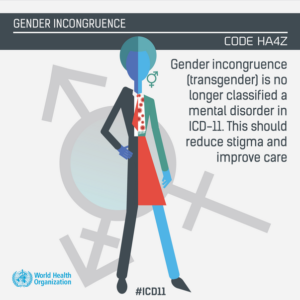Coming to Terms: World Health Organization Takes Positive Step with Transgender Reclassification

Last week marked a step forward for the global trans community. On Monday, June 18, The World Health Organization (WHO) announced that “transgender” would no longer be classified as a mental health disorder in the International Statistical Classification of Diseases and Related Health Problems, commonly referred to as the International Classification of Diseases, or ICD.
The ICD is described as “providing a holistic look at every aspect of life that can affect health.” It has a code for any injury or disease that affects the human condition, as well as influencing factors on health. These statistics help us better understand the trends in disease and epidemics, which influences healthcare services worldwide and health insurance billing in the United States.
WHO determined that transgender—or “gender incongruence,” which is the term used in the ICD—is extremely stigmatizing when classified as a mental disorder. It is now classified under “conditions related to sexual health.” Some may not agree with it remaining there, but coding the term in the ICD is beneficial when it comes to billing, insurance, and conducting medical research.
Conversations about de-classifying transgender as a mental illness have been ongoing since 2016. Geoffrey Reed, the coordinating psychologist for the mental health section of the ICD, said that the intention is “to reduce barriers to care.” Other changes brought to the table were renaming the term altogether. Previously referred to as “transsexualism” before the most recent ICD update, WHO proposed gender incongruence as a more fitting term as it expresses a “discrepancy between a person’s experienced gender identity and their body.” Others pushed back due to language barriers. The word “incongruence” has a negative or slightly “psychotic” connotation when translated to Spanish.
This is similar to naming the diagnosis of homosexuality in the Diagnostic and Statistical Manual of Mental Disorders, also known as the DSM, which is published by the American Psychiatric Association. In 1973 the term “homosexuality” was changed to “sexual orientation disturbance,” and then “ego-dystonic homosexuality.” The term was completely removed from the DSM in 1987. Homosexuality was also removed from the ICD in the ’70s.
The term for transgender also appeared in the DSM as “sexual deviations” in 1968, “psychosexual disorders” in 1980, and “sexual and gender identity disorders” in 1994. The current term in the most recent edition of the DSM is “gender dysphoria,” which applies to transgender individuals who experience dysfunction or distress due to being assigned the wrong gender. It’s important to note that while distress is experienced due to the nature of dysphoria, much of it is also due to stigma and poor treatment by others.
Some doctors support removing “gender dysphoria” from the DSM, but not “gender incongruence” from the ICD. This is because the DSM is only limited to mental disorders, while the ICD categorizes all conditions that affect the health of the human condition. Keeping it in the ICD increases access to medical care because transgender is coded as a medical category.
It’s easy to understand the desire to remove “transgender” from the International Classification of Diseases, so as to normalize and destigmatize the identity, which was the case with homosexuality. However, if removed, how will the transgender community access the medical care they desire? Lesbian, gay, and bisexual people do not rely on access to medical treatment as much as transgender people who desire congruency. Having access to medical treatment to receive hormone therapy, sex reassignment surgery, or even binding is often necessary for affirmation, survival, and navigating daily life. The US government does not consider the safety of non-binary people when they view their medical care as unnecessary. Quite the opposite is happening in France, where healthcare access is considered a human right instead of a privilege.
De-classifying transgender as a mental condition in the ICD will hopefully encourage transgender people to seek medical assistance if they desire. While it’s still listed as a condition, this is a step away from stigma towards affirmation, inclusion, and support, and exists for those who need care.
